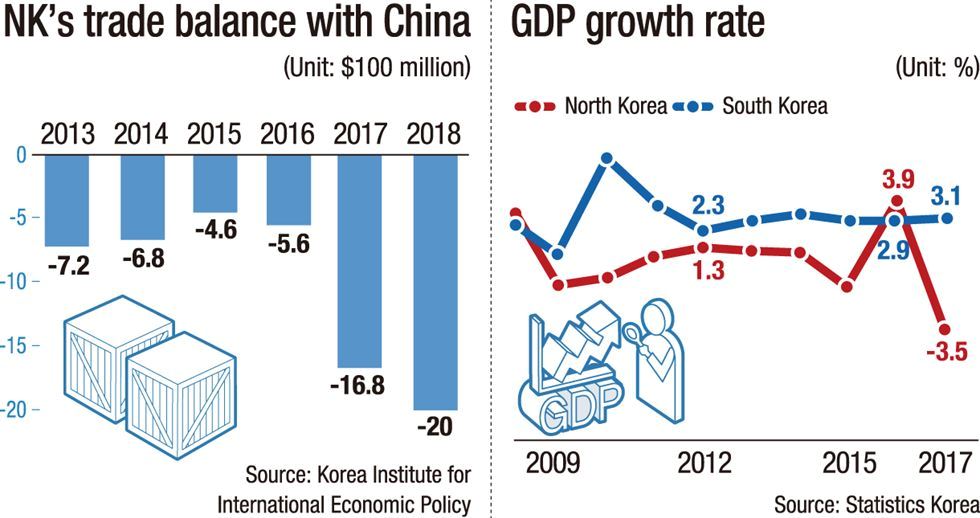[Analytics] Sanctions push N. Korean economy to brink

International sanctions have pushed North Korea to the edge of economic collapse, with its trade deficit with China hitting a record high due to a plunge in exports and imports, according to analysts. Lee Kyung-min specially for The Korea Times.
They said Pyongyang’s failed yet consistent demands during the second U.S.-North Korea summit that sanctions be partially lifted is a strong indication of how dire its economic situation is.
The view came after the Feb. 27 summit was cut short as neither side was willing to compromise. The North demanded some sanctions be lifted first and foremost prior to denuclearization, while the U.S. said the reclusive regime should take more concrete steps toward nuclear disarmament.
“Looking at China’s January trade data, it is clear that North Korea’s exports remain at rock bottom and that imports also are very weak and probably falling, as North Korea doesn’t have the hard cash to buy anything of an investment nature,” William Brown, adjunct professor at Georgetown School of Foreign Service, told The Korea Times.
“Some consumer goods continue to flow in, almost normally, but there are almost no imports of any kind of machinery, or trucks or tractors for that matter. Without these kinds of imports, little investment can take place and the economy will continue to falter.”
In a recent report published by the Korea Development Institute (KDI), chief researcher Lee Suk said the isolationist regime saw its economy deteriorate in 2018.
“The macroeconomics in the North that began showing signs of faltering in 2017 are believed to have worsened in 2018,” he said in the report.
The North’s China-reliant trade nearly collapsed, the report said, due mostly to biting international sanctions.
China is the largest, and practically the only, trading partner of North Korea, accounting for over 90 percent of its trade.
North Korea saw trade valued at $2.46 billion with China in 2018, a 50 percent drop from $4.98 billion the previous year.
Its exports to China decreased to $220 million in 2018, an 87 percent drop from $1.65 billion a year earlier. The figure was a 92 percent drop compared to that in 2016.
Imports from China also decreased to $2.24 billion in 2018, a 33 percent drop from $3.33 billion a year earlier.
As a result, North Korea recorded a trade deficit of $2 billion in 2018, the highest amount researchers have ever seen.
“The year 2019 will be particularly grueling for the country given that sanctions will remain in place,” Korea Institute for International Economic Policy (KIEP) researcher Jeong Hyung-gon said in the report.
“The implementation of international sanctions since mid-2017 began to have an impact on the North’s economy. As the U.S. will maintain maximum pressure without tangible denuclearization steps taken by the North, the regime will suffer much greater than what has been seen thus far.”
Given the numbers, the report projected the North’s GDP will contract 5 percent in 2018, a steeper downturn from the 3.5 percent contraction in 2017.
Quid pro quo approach
Joseph DeTrani, a former special envoy for nuclear talks with North Korea, said the Hanoi summit failed because the North had not shown a commitment commensurate to complete denuclearization.
“Sanctions are biting, which were the result of North Korea’s multiple missile launches and nuclear tests in 2017. So, they want relief,” a former US intelligence official said.
“But relief should be commensurate with their commitment to completely denuclearize. They asked for too much and gave too little.”
Park Strategies Senior Vice President Sean King said more sanctions are needed to force the Kim regime to give up nuclear weapons.
“Nobody outside can really know the state of North Korea’s economy but I can only imagine it’s not great if Kim’s asking for sanctions relief,” he said.
“As Kim’s request for sanctions relief suggests the sanctions are working, we should thus ratchet up the sanctions and finally also sanction the primarily mainland Chinese banks handling gangster-state North Korea’s cash.”